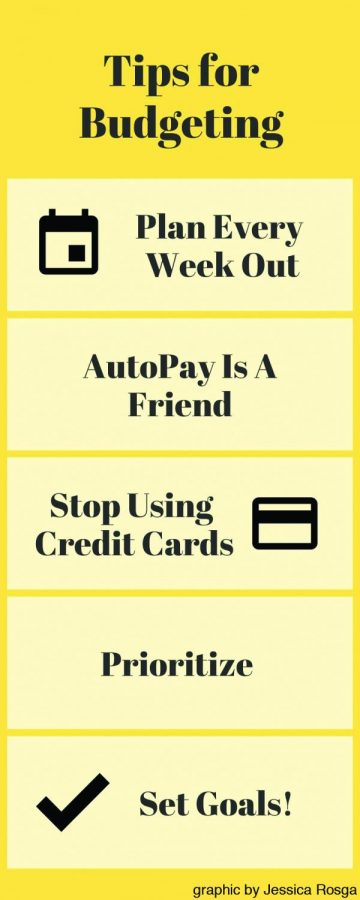Tips and tricks: How to budget your money as a student
Tips for Budgeting graphic
November 15, 2019
With having a lot of payments and concerns such as tuition, rent, groceries, car payments, beloved Wi-Fi, credit cards and more, the possibilities of having extra money to spend on yourself or even a night out seems hard to accomplish. Despite not having a high income, there are still tips on how to budget.
Budget at the beginning of the week
If you know a paycheck or some other form of money is coming, plan ahead of time. Look out to see if there are any bills in the next couple of weeks that you may not be ready for financially. When money does come in, make sure to set some aside before spending it on yourself.
Make a specific schedule
Autopay is a blessing and a curse. Autopay works great for things such as credit card bills, car payments and just about anything that needs to come out of your account regularly.
Setting these up for specific days each month will be a breath of fresh air as you don’t need to remind yourself that something is coming up. Make sure you have enough in your account to start with — which shouldn’t be a problem if you complete tip one.
Credit cards need to go
Credit cards seem nice until two months later you realize how much money you were spending now that you have to pay with real money. Credit cards are wonderful to have for emergencies although most don’t use credit cards for just that.
Give your card to a trusted person for a week or two and have them hide it. Out of sight, out of mind.
Prioritize
Pay the bills that you need to first. This may seem like a logical tip, but knowing these things are key to budgeting in the first place. Make sure to prioritize paying the Wi-Fi instead of going out for dinner, for instance.
Of course this is easier said than done, but your friends will understand if you can’t do something due to financial issues. We’re all in the same boat.
Set Goals
Last but certainly not least, make sure to set goals for yourself. If you are a goal-oriented person, make sure to create monthly goals. How much would you like your accounts to be at by the end of the month? Is your goal to start paying back student loans?
While setting these goals for yourself, make sure to keep them realistic. Keep a pen on hand — you’ll need something to cross out your completed goals.
At the end of the day, money is not everything but it does play a major role in everyday life. Being aware of your financial state of mind is worth it. Follow these tips and you’ll slowly gain knowledge and tricks of your own.














